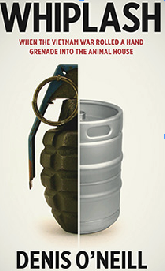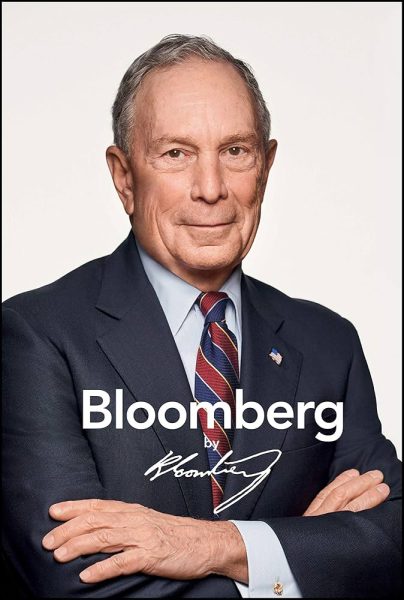Interview: Denis O’Neill – Author of Whiplash

February 14th. Library Study Room. 5 PM. The phone rang over speakerphone as I twirled my pen and waited for the pickup. Two seconds later, I was talking to the author of Whiplash, Denis O’Neill, uncle of Caroline O’Neill, and fellow Nutmegger. After bonding over our small world ties to Connecticut, we immediately jumped into the topic of the weather. While here at Dickinson we were knee deep in snow, Mr. O’Neill was soaking up the warmth at his home in Beverly Hills. However, he still remembered those kinds of days when going to college at Dartmouth, suffering through the terrible cold and snow, trudging on to class.
So, I asked him about his background – went to Dartmouth during the late 60s and early 70s. Journalism Degree. Worked for Public Television, specifically GBH TV, moved to Hollywood in 1985. Script writer – even wrote a script for Meryl Streep. Other films and scripts included The River Wild (1994), A Shot at Glory (2000), and War Photographer (2001). Before Whiplash, his first novel, he wrote many short stories, as well as articles for magazines, such as Sports Illustrated. Having always wanted to write a novel, to branch out from the norm of scripts and shorts, O’Neill decided that the best place to start was to write about something he knew, something that has stayed with him for a long time.
The main conflict of Whiplash involves the December 1st 1969 draft pick for Vietnam. The novel details the lives of the students during this turbulent time in history, from their ‘Animal House’ like craziness, to their war protests and their determination to get out of the draft.
O’Neill: “War just swept over the nation. Dartmouth became a changed place. The hand grenade that rolled into the campus was the reinstatement of the draft lottery.”
One of O’Neill’s friends Billy, a senior when O’Neill was a freshman (although made only one year older in the novel), died just three weeks into the war, becoming a specific hand grenade that made O’Neill, his fraternity brothers and the rest of campus realize that this war was terrible and needed to end, as it was certainly unable to be won.
O’Neill: “The country turned after Nixon. They realized this wasn’t a good war. Strikes started on campus and the students realized they had to fight. Supporting the ROTC was rocked out of the campus. These protests succeeded in a lot of campuses. There weren’t that many kids on campus in those days, maybe 800 or 3,000 total on campus. It was an anxious time, and with those small numbers, you were obliged to join the protest.”
The class featured in Whiplash went on to become the first class to graduate with draft numbers, as many figured out how to intelligently weasel their way out of getting cleared for war. Whiplash is not supposed to be just a memoir or autobiography about this time in O’Neill and his friends’ lives – he wanted it to be something that college kids could learn from.
O’Neill: “It was a crazy year. We went from the season of love to a season of anger, killing and despair. College was not only figuring out what you wanted to be, but also learning how to survive. It was a unique time. Coming of age is a universal passage… And during the war decisions became life and death. Trying to figure out how to get out of it was just scary.”
We discussed more about what drew him to write Whiplash.
O’Neill: “It had been marinating in my head. There have always been war stories from the front, but not so much about on-campus turmoil. So, I knew the story was unique. It was also a way to step out of my writing style.”
He also went on to mention his three boys, for whom he wanted to leave behind a legacy or record of this important section of his life. It was exciting for him to go back in time and remember what once was – he began e-mailing his old pals, receiving help on remembering the hazier parts, searching for multiple perspectives to fully detail the past. Upon reading the book myself, I noticed the almost movie-like quality of the description. You become immersed in the reality of these college years at Dartmouth. These details shape a vivid image of a college experience during the Vietnam War. And, with an added insight into the characters of Whiplash, I learned that 95% of everything that happened in the novel is true – stories that didn’t happen to Denis O’Neill himself, had happened to a friend. One of his prized and most ridiculous tales within the novel involves a planned train derailing to get some beer. Another, more serious and stressful suspenseful tale is during a Dartmouth hockey game during the draft pick; students played hockey as numbers are shouted out to them on the rink to tell them whether or not they would be going to war. O’Neill wanted to write a book that portrayed a terrifying reality that is both “specific and reflective” during the draft pick of ’69. He also wanted to show college students like us the importance of not only questioning authority, but also challenging authority when needed.
Naturally, as an aspiring writer myself, I then asked O’Neill about the process of writing his novel – was it enjoyable? How did you go about writing it? Was there any extra research involved? What was the easiest and hardest part to write about?
O’Neill: “It was fun to relive my college days. Also, as said before, it was fun to get outside screen writing and to have a different voice. I remembered most of what I wanted to write about but I called up my friends to see how they remembered things so I could piece together a pretty accurate version. I also looked at the ‘Daily D’ Dartmouth newspaper articles during that time. I never kept a journal but I was always thinking about it… The timing of the novel is coincidental. There seems to be a preoccupation with the 60s now. And to be able to live during those interesting times, being able to write about it puts a smile on my face. However, the squeaky wheel to writing was talking about the rigorous academic atmosphere, classes and studying, because that seems a bit boring. The most important learning is outside the classes, so there was so much material and stories I had to leave out. To find proper balance between shenanigans and the darker aspects was difficult.”
From here we discussed how his novel has been received since its release in October of last year. After an NPR interview with Robin Young, as well as an on-camera interview with Tom Hanks’ company, the tales of campus turmoil in Whiplash very well may make it into a mini-series. He discussed his work as a ‘one man band’ – finding his own access into the markets, working to expand readership through college book reviews, Facebook, Twitter, etc. In fact, in the spring he will be a part of a documentary on CNN about the ‘60s. The tale of the beer train raid is also being made into a clip on Brobible.com.
With the interview coming to an end, I decided to ask Mr. O’Neill some fun questions.
How do you relax?
“I walk everyday. Cook. I’m a fly-fisherman and I’ve been to many parts of the world because of it.”
Favorite Motivational Phrase or Quote?
“No time like the present” or “Shoot for Bliss, Settle for Joy.”
What is your favorite book?
“A River Runs Through.” It’s about two brothers and a father. I have a three brothers and an Irish father, and this novel really resonated in my own life.”
Which famous person – living or dead – would you like to meet?
“James Joyce or Richard Harris.”
What advice would you give to aspiring writers?
“Read good writers. Just be able to embrace curiosity. Keep your eyes wide. Try to make note of small bits of color, voice… details. It’s like those paintings with dots. When you step back it becomes a masterpiece.”
For more information on Denis O’Neill, Whiplash, and his other works, go here:
http://denisroneill.com/whiplash/



